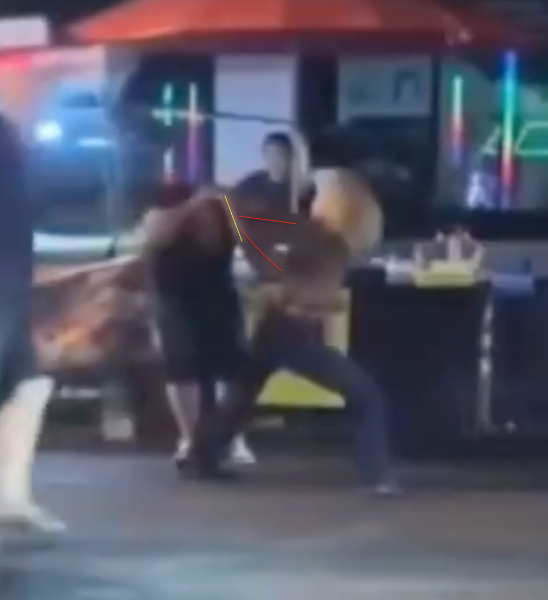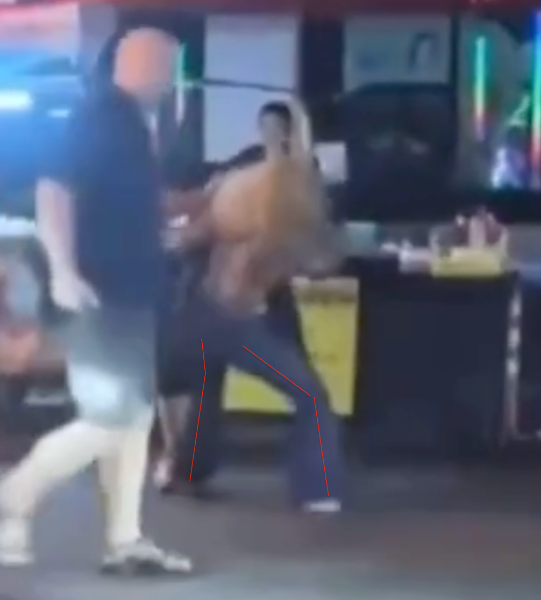-
Posts
36,949 -
Joined
-
Last visited
-
Days Won
34
Content Type
Events
Forums
Downloads
Quizzes
Gallery
Blogs
Everything posted by richard_smith237
-
It's not about need at all. No one needs to become friends with anyone - most of us are perfectly capable of living solitary lives in relative comfort. But having trusted friends to socialise and connect with is one of life’s pleasures for many. From my perspective, there’s no reason why that circle of friendship shouldn’t include a Thai, or indeed any foreign male, if there’s genuine common ground. So when someone deliberately avoids such interactions and states they would only befriend fellow foreigners, it suggests a certain negative attitude - a kind of quiet prejudice towards the local population.
-
Yeah... I just rewatched the video to double checked why she didn't see the bus coming.. And it does look as though she 'leaned forwards' to take a look up the road... but somehow completely ignored the oncoming bus and stepped out anyway.... Almost as if this was nothing more than just a 'movement habit' in the same way Thai's will 'duck slightly' when passing a an elder... more muscle memory than active action.
-
Should she have known that she was about to be hit by a bus speeding on the wrong side of the road ? Should she have stepped into the road unaware that such a danger was even a possibility - especially in Thailand? Of course she should have known. Or rather, she should have been aware of the potential for vehicles travelling the wrong way, or using the outer lanes (in the wrong direction) to bypass stationary traffic. Had she simply looked, she wouldn’t have been hit - though that doesn’t absolve the bus driver, who was clearly in the wrong. What continues to astonish me is that anyone would step into a lane of traffic without first checking for oncoming vehicles. It’s basic self-preservation. In situations where traffic is at a standstill, it's nearly always motorcycles tearing up the outside. It's common. Predictable, even. And it must be anticipated for basic measures of road safety.
-
No, it doesn’t block the view outright, but it does impair the ease with which one can see up the road. That said, in nearly every recent thread discussing pedestrian crossing accidents, the individuals who were struck t because they stepped out without looking, distracted and unaware. This isn't to place blame squarely on the pedestrians, but there was undeniably a lapse in self-preservation - a failure to exercise the caution necessary in such situations, which contributed to their injuries or worse. When traffic halts at a pedestrian crossing, it takes but a moment to glance up the road - in both directions - before stepping into the next lane. This is perfectly feasible even if the vehicle that’s stopped for you is a bus or lorry. In fact, the larger the vehicle, the more critical it becomes to check that the adjacent lane is clear. Just because it looks easy doesn’t mean it is. A motorcycle lane-splitting at speed can appear from nowhere, and without that glance, you’re dangerously exposed. This is basic road safety 101: never assume, always look - and double-check. Having watched numerous CCTV clips of pedestrian crossing incidents in the news, two common threads emerge every time: - Someone wasn’t paying attention. - A vehicle didn’t stop. It almost always comes down to one - or both - of these avoidable failures.
-
I can remember at least 10 that have been reported just here, Specifics would add kudos to your claim of knowledge of at least ten and over what period of time? This 'kudos' you speak of? You may file it alongside your tiresome pedantry, where it rightly belongs..... 67‑year‑old Irishman fell from the 31st floor of a luxury hotel in Pattaya on 19 August 2024 36‑year‑old New Zealander, Akuhata Edward Robert Hammind, fell from a 7th‐floor balcony of a Pattaya hotel and died on 29 August 2024. 32‑year‑old Russian woman fell to her death from the 7th floor of a condo in Sattahip district on 14 August 2023 26‑year‑old Russian woman identified as “Ms K” jumped from the 14th floor of a Pattaya condominium on 7 April 2025. 34‑year‑old Polish tourist, “Swalomir,” lost balance and fell from a 5th‑floor Phuket condo balcony on 3 May 2025 British tourist, Martin, age 69, fell from the 4th floor of a Pattaya hotel on 4 February 2024 and later died. 74‑year‑old British man, paralyzed, fell from the 4th floor of an East Pattaya condo on 22 January, 2025. 25‑year‑old Uzbek woman, Ms Choksanam, fell from a 6th‑floor balcony at a Pattaya hotel on 7 December 2024, survived with serious injuries. 51‑year‑old Englishman, Paul Hadfield, heavily intoxicated, fell from the 2nd floor of a Pattaya hotel on 4 November, 2024. 27‑year‑old Swiss man, Luis Anders Engel, fell from a 3rd‑floor condo balcony in Jomtien (Pattaya) on 7 December 2023, breaking his leg and dislocating an ankle after leaning on a railing while smoking 41‑year‑old Chinese tourist, Wang Anjun, fell from a 5th‑floor hotel balcony in Karon, Phuket, early morning 27 December 2024. He was found injured after drinking with friends, later pronounced dead in hospital. Unnamed South Korean man, aged 62, fell from a 10th‑floor balcony of a Pattaya hotel on 2 September 2024, landing on a terrace below, died at the scene. Austrian tourist (unnamed) fell from the 4th floor of a Bangkok hotel room on 11 January 2024.
-
Does it matter what languages are spoken in other countries or that Thai is a 'single country language' if we are living here all the time ??? I can speak French and have only ever used it sporadically when visiting France, thats is... But, I also get your point - Thai is a very difficult language to master and some people have a greater affinity for languages than others, many struggle with the tones here... but, I see no harm in making continued efforts to improve - even without lessons etc my Thai slowly improves... That said, all the close Thai friends I have are fluent in English and that has made a huge difference.... it also makes a difference because they are 'educated' and speak fluent English - hence the ease of overlap - there's just more in common ground in general....
-
I think it’s a trick of the photo angle. Anyway he didn’t fall over those railings, he fell down the stairs Agreed... nevertheless, the observation is valid - with the amount of people falling of balconies etc here - this just shows how low some of the railings are. Separately, as you point out: Its incredibly unfortunate to kill yourself from a simple fall down stairs... but it also highlights how devastating an head impact can be... (meanwhile some on this forum think its ok not to wear a helmet on a motorcycle when popping to the nearby 7-11 - but this incidence shows what a simple fall and head impact can do).
-
It’s a curious thing – I can’t imagine living in a country and not forming genuine friendships with the locals - but its not something that can be forced, building a friendship has to be an organic process. One of my closest friends of over 20 years is Thai. I’ve played on Thai football teams, made strong friendships along the way, and spent countless nights out together. Later, when married, those nights turned into shared holidays – first as couples, and eventually with our families. Dinners, trips, everyday life... it all blended into something very natural and normal. Many of my Western friends here have also built close relationships with Thai friends, and through them, there’s been a kind of social overlap – I've ended up becoming friends with their Thai mates too. The majority of Westerners I know who've spent any meaningful amount of time here have integrated to a degree, forging authentic, everyday friendships. A key factor, I’ve noticed, is having a similar socio-economic and educational background. When that alignment’s there, there's simply more common ground.... from language and humour to shared cultural references and values. That said, I’m not likely to be knocking back Lao Khao and getting legless with the win-motorbike lads on the corner - I see Thai males from that 'different' demographic as being somewhat more risky especially when alcohol is included - I think many would say the same thing. I remember one Westerner telling me he’s never met a Thai guy who didn’t want something from him – usually money. And while that might be his experience, I suspect it's more a reflection of crossing social strata than anything inherently cultural. Then there are the added 'friendships' that a more like acquaintances through common ground, such as parents of children's school friends.... We've holidayed, had dinners etc and there is a lot of common ground though true friendships have not developed. There is also an added facet to friendships, and I think it holds across all cultures and nationality - thats Age... Its far easier to develop friendships when younger. When older we are perhaps more cautious of new people, more guarded, and socialise less which reduces opportunity.
- 124 replies
-
- 17
-

-

-

-

-

-

-
The famous saying on this forum, something I've been hearing since arriving here... "Always look both ways when crossing a one day street".... Clearly, this wasn’t a one-way street, but even so, the bus was unlawfully driving on the wrong side of the road. Yet again, we witness another pedestrian failing to look, seemingly operating under the assumption that it’s safe to cross with disregard for their own wellbeing.... Thats not to suggest its the pedestrians fault, but I could never imagine crossing a road here or anywhere, without checking, checking and then checking some more...
-
You need to focus on his left arm. You just missed it. It's at the very beginning of the video. You can clearly see his left arm pushing her to the floor. Look at the motion the arm makes. An obvious and forceful push. Yep.. thats what I'm looking at... He's got his arms coving his head. She's trying to wrench his left arm from his head. He either slips, or just lets his left arm go, and backwards she calls, because she's off balance and using all her weight to pull his arm... It only 'looks like a push' (to some) because of his arm movement, but thats just because he's let his arm go free rather than resisting her.... His arm is only lowered because she managed to wrench it free from his head, but in doing so lost her purchase of his arm and her balance. His other had remains on his head - I'm guessing if he wanted to push her, he might have done so with both hands. He was being very defensive, she slipped...
-
You keep saying he pushed her - there was no ‘push’ at all… She was grabbing his arming, trying to wrench it from his head, she was using her body weight & leaning back… … when his hand slipped off his head, she lost her grip & fell back… Its a simple slip… but because his hand moved away as she was was dragging on it & she fell backward some are incorrectly seeing that as a push…. perhaps because they don’t want to see it any other way than ‘bad farang’…. You are clearly seeing the push because that’s what you want you see… look where her feet are positioned when she’s dragging on his arms… one slip & she on her bum - that’s it…. Then she was slapping him around a lot… The Swede has a good case to file assault charges & against both the woman & the other men involved in the group attack. I still don’t see any trigger point from him & visuals show total non-aggression to the point of total submission. No idea what he may have said - it might have been something quite nasty to trigger her… or something mild & shes just an unhinged nutter.
-
Yes... the 'American Indian' above kind of gave that away.... ... though you didn't know 'how'... thus: my comment explains 'how' you likely or inadvertently gained access... You'll need to know 'how' when you try and reconnect as the connection between your phone and the dash-cam is not a permanent thing and you may need to go through the 'reconnection process' next time you want to connect.... Particularly if you have AppleCarPlay or reset connections on your phone etc.
-
This is the correct answer... A lot of Dash-Cam's (both of mine) - you connect to the CAM itself via Wifi-Connection... (which is not an internet connection - but just a connection over Wifi to the Dash-cam - thats it)... ... The phone recognises that there is 'no internet' from the Dash-Cam - because its not a Wifi-Router its just a dash-cam - nevertheless the connection between phone (app) and Cam is established and the App can the access the dashcams features. This type set up is fairly universal... Addtionally - IF you have AppleCarPlay (GooglePlay) connected to your car etc that connection will prevent you from connecting to the Dash-Cam Wifi-Connection, thus you may need to 'disconnect' the phone from the AppleCarPlay (GooglePlay)...
-
Very true... I saw something similar unfold... two guys out... one guy, got his bill, paid by QR code and left. The other guy went to leave 10mins or so later, called his bill and questioned the amount.. the bar tried to charge him for both him and his mate. A woman in the bar was going nuts at the guy... But he had the QR proof that his mate had paid. He was chilled, went to the casher to sort it... Meanwhile the woman was still shooting off her mouth... The guy paid his part of the bill and left... Maybe the woman made a genuine mistake and thought the other guy didn't pay - but she was extremely quick to boil over, shout and start throwing insults.... just part of the scenery and the guy didn't react... But it shows how quickly things can boil over when someone is mentally unstable.
-
I know you 'want' to see it that way, but are you really so sure he 'pushed her to the floor' ???... I doesn't look that way at all.. She slipped backwards. She was leaning back with her weight and grabbing his arms trying to pull them away from his head.. .. As she leaned back grabbing his arm, his hand slipped off his head (this is why you think he pushed, her, but he just released her grip because his hand slipped... ) ... She fell back onto the floor - she wasn't pushed, she lost her grip on his arm and fell... thats it... no violence from the guy. There is no indication that the Swede wanting anything else other than to get away... ... "why you said that to me?.." - is something the aggressive Thai woman said - she was was 100% the aggressor, no aggression from the Swede whatsoever - total submission throughout... But... What did he say ???... something clearly sent her way over the edge... Nevertheless, this man showed no indications of being aggressive to the woman, no reason for the Thai men to jump in at all.
-
The most surprising part of this story !!! Assumption: No driver training - using left foot to brake, right foot to accelerate... ended up wrong foot on wrong pedal ? ... I just don't see sow much a mistake is otherwise possible, but we read of such issues a lot here, usually with a car ending up nose down off a multistory car-park !
-
With respect, please expand on these powerful people to whom he was a danger Those who knew what he was up to, were either accomplices or took a 'piece of the pie' to stay quiet and now want plausible deniably (witness removal) - once they had this man cornered, he was going to sing like a canary and everyone knew it (or at least thats was 'people' would have been worried about). Graft as such a level simply does not exist in a vacuum without accomplices and other 'powerful' people in the mix. If you wish for 'names' as purely a point scoring exercise on a forum you are showing both a degree of naivety and misunderstanding of how things operate, perhaps deliberately so.... This was a very 'Epstein-esque' ending to this mans life... highly suspicious don't you think ?





